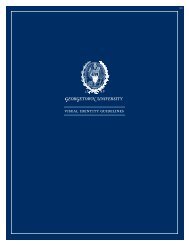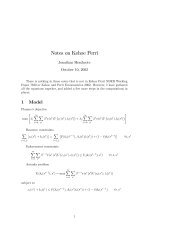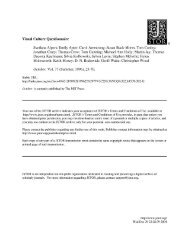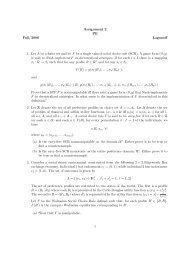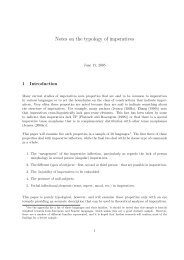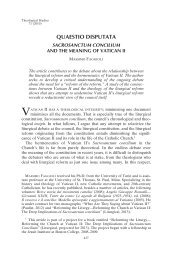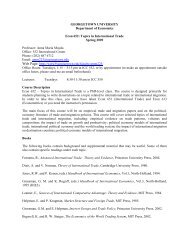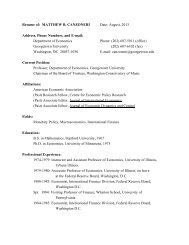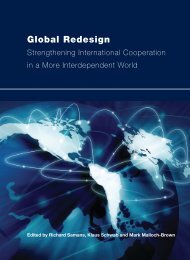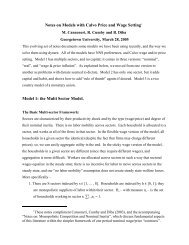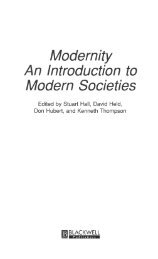Islam and the West: Annual Report on the State of Dialogue
Islam and the West: Annual Report on the State of Dialogue
Islam and the West: Annual Report on the State of Dialogue
You also want an ePaper? Increase the reach of your titles
YUMPU automatically turns print PDFs into web optimized ePapers that Google loves.
Territories, where just over half held this view. Once again<br />
<str<strong>on</strong>g>the</str<strong>on</strong>g> similarity between Israeli <str<strong>on</strong>g>and</str<strong>on</strong>g> Palestinian assessments<br />
<strong>of</strong> <str<strong>on</strong>g>the</str<strong>on</strong>g> state <strong>of</strong> <str<strong>on</strong>g>the</str<strong>on</strong>g> relati<strong>on</strong>ship between <str<strong>on</strong>g>the</str<strong>on</strong>g> Muslim <str<strong>on</strong>g>and</str<strong>on</strong>g><br />
<str<strong>on</strong>g>West</str<strong>on</strong>g>ern worlds is remarkable.<br />
The “nature” <strong>of</strong> <str<strong>on</strong>g>the</str<strong>on</strong>g> c<strong>on</strong>flict<br />
• Thinking about <str<strong>on</strong>g>the</str<strong>on</strong>g> tensi<strong>on</strong>s between <str<strong>on</strong>g>the</str<strong>on</strong>g> Muslim <str<strong>on</strong>g>and</str<strong>on</strong>g><br />
<str<strong>on</strong>g>West</str<strong>on</strong>g>ern worlds – do you think <str<strong>on</strong>g>the</str<strong>on</strong>g>y arise more from<br />
differences <strong>of</strong> religi<strong>on</strong> or differences <strong>of</strong> culture or from<br />
c<strong>on</strong>flicts about political interests?<br />
Ano<str<strong>on</strong>g>the</str<strong>on</strong>g>r questi<strong>on</strong> helps inform analysis in <str<strong>on</strong>g>the</str<strong>on</strong>g> c<strong>on</strong>text <strong>of</strong><br />
<str<strong>on</strong>g>the</str<strong>on</strong>g> Clash <strong>of</strong> Civilizati<strong>on</strong>s <str<strong>on</strong>g>the</str<strong>on</strong>g>sis. When asked whe<str<strong>on</strong>g>the</str<strong>on</strong>g>r<br />
tensi<strong>on</strong>s arise more from differences <strong>of</strong> religi<strong>on</strong> or<br />
differences <strong>of</strong> culture or from c<strong>on</strong>flicts about political interests,<br />
majorities around <str<strong>on</strong>g>the</str<strong>on</strong>g> world – including <str<strong>on</strong>g>the</str<strong>on</strong>g> United <strong>State</strong>s,<br />
Israel, Denmark, Turkey <str<strong>on</strong>g>and</str<strong>on</strong>g> Egypt – say culture or religi<strong>on</strong><br />
is to blame. There are, however, two notable excepti<strong>on</strong>s.<br />
In The Palestinian Territories <str<strong>on</strong>g>and</str<strong>on</strong>g> Iran, resp<strong>on</strong>dents are<br />
more likely to blame political interests. Ir<strong>on</strong>ically, <str<strong>on</strong>g>the</str<strong>on</strong>g>se are<br />
<str<strong>on</strong>g>the</str<strong>on</strong>g> two nati<strong>on</strong>s most <strong>of</strong>ten associated with a <str<strong>on</strong>g>the</str<strong>on</strong>g>ological<br />
antag<strong>on</strong>ism to <str<strong>on</strong>g>West</str<strong>on</strong>g>ern values in c<strong>on</strong>servative US media.<br />
Does this result mean that many global citizens believe<br />
c<strong>on</strong>cepti<strong>on</strong>s <strong>of</strong> culture <str<strong>on</strong>g>and</str<strong>on</strong>g> religi<strong>on</strong> in Muslim societies are<br />
incompatible with those in <str<strong>on</strong>g>the</str<strong>on</strong>g> <str<strong>on</strong>g>West</str<strong>on</strong>g> – or worse, that <str<strong>on</strong>g>the</str<strong>on</strong>g>ir<br />
own faith teaches <str<strong>on</strong>g>the</str<strong>on</strong>g>m to oppose <str<strong>on</strong>g>the</str<strong>on</strong>g> o<str<strong>on</strong>g>the</str<strong>on</strong>g>r? Given <str<strong>on</strong>g>the</str<strong>on</strong>g><br />
finding noted above that majorities around <str<strong>on</strong>g>the</str<strong>on</strong>g> world say<br />
c<strong>on</strong>flict between <str<strong>on</strong>g>the</str<strong>on</strong>g> Muslim world <str<strong>on</strong>g>and</str<strong>on</strong>g> <str<strong>on</strong>g>the</str<strong>on</strong>g> <str<strong>on</strong>g>West</str<strong>on</strong>g> can be<br />
avoided, <str<strong>on</strong>g>the</str<strong>on</strong>g> answer is probably not.<br />
However, it is more likely that resp<strong>on</strong>dents <strong>on</strong> each side<br />
believe those <strong>on</strong> “<str<strong>on</strong>g>the</str<strong>on</strong>g> o<str<strong>on</strong>g>the</str<strong>on</strong>g>r side” are taught to harbour<br />
cultural or religious biases against <str<strong>on</strong>g>the</str<strong>on</strong>g>m, ra<str<strong>on</strong>g>the</str<strong>on</strong>g>r than<br />
interpreting <str<strong>on</strong>g>the</str<strong>on</strong>g>ir own faith to require c<strong>on</strong>flict 27 .Forexample,<br />
in 2005, 42% <strong>of</strong> Egyptians associated “religious extremism<br />
is comm<strong>on</strong>” with <str<strong>on</strong>g>the</str<strong>on</strong>g> United <strong>State</strong>s, while <strong>on</strong>ly 10% associated<br />
<str<strong>on</strong>g>the</str<strong>on</strong>g> same attribute with Saudi Arabia. At <str<strong>on</strong>g>the</str<strong>on</strong>g> same time, 88%<br />
agreed that <str<strong>on</strong>g>Islam</str<strong>on</strong>g> opposes <str<strong>on</strong>g>the</str<strong>on</strong>g> use <strong>of</strong> attacks <strong>on</strong> civilians 28 .<br />
When asked what <str<strong>on</strong>g>the</str<strong>on</strong>g> United <strong>State</strong>s could do to improve<br />
relati<strong>on</strong>s with <str<strong>on</strong>g>the</str<strong>on</strong>g> Muslim World, Egyptians resp<strong>on</strong>ded that<br />
America should show greater respect for <str<strong>on</strong>g>Islam</str<strong>on</strong>g>. This suggests<br />
that many Egyptians believe in a sort <strong>of</strong> reverse “clash<br />
<str<strong>on</strong>g>the</str<strong>on</strong>g>sis” where <str<strong>on</strong>g>the</str<strong>on</strong>g> <str<strong>on</strong>g>West</str<strong>on</strong>g> antag<strong>on</strong>izes Muslims because <strong>of</strong> a<br />
religiously motivated hatred <strong>of</strong> <str<strong>on</strong>g>Islam</str<strong>on</strong>g>ic values, ra<str<strong>on</strong>g>the</str<strong>on</strong>g>r than<br />
<str<strong>on</strong>g>the</str<strong>on</strong>g> o<str<strong>on</strong>g>the</str<strong>on</strong>g>r way around. A recent poll suggests <str<strong>on</strong>g>the</str<strong>on</strong>g>y are not<br />
al<strong>on</strong>e; majorities in Morocco, Pakistan <str<strong>on</strong>g>and</str<strong>on</strong>g> Ind<strong>on</strong>esia<br />
believe spreading Christianity in <str<strong>on</strong>g>the</str<strong>on</strong>g> Middle East is a goal<br />
<strong>of</strong> <str<strong>on</strong>g>the</str<strong>on</strong>g> United <strong>State</strong>s, <str<strong>on</strong>g>and</str<strong>on</strong>g> majorities also believe <str<strong>on</strong>g>the</str<strong>on</strong>g> goal<br />
<strong>of</strong> <str<strong>on</strong>g>the</str<strong>on</strong>g> war <strong>on</strong> terror is ei<str<strong>on</strong>g>the</str<strong>on</strong>g>r to exploit oil resources or to<br />
divide <str<strong>on</strong>g>and</str<strong>on</strong>g> weaken <str<strong>on</strong>g>Islam</str<strong>on</strong>g> <str<strong>on</strong>g>and</str<strong>on</strong>g> its people 29 .<br />
C<strong>on</strong>clusi<strong>on</strong><br />
The data suggest that <str<strong>on</strong>g>the</str<strong>on</strong>g> negative percepti<strong>on</strong>s <strong>of</strong> Muslim-<br />
<str<strong>on</strong>g>West</str<strong>on</strong>g> relati<strong>on</strong>s are most prevalent in <str<strong>on</strong>g>the</str<strong>on</strong>g> United <strong>State</strong>s,<br />
Israel <str<strong>on</strong>g>and</str<strong>on</strong>g> <str<strong>on</strong>g>the</str<strong>on</strong>g> Muslim Middle East, reflecting <str<strong>on</strong>g>the</str<strong>on</strong>g> acute<br />
c<strong>on</strong>flicts currently raging in Iraq <str<strong>on</strong>g>and</str<strong>on</strong>g> <str<strong>on</strong>g>the</str<strong>on</strong>g> Palestinian territories.<br />
Despite <str<strong>on</strong>g>the</str<strong>on</strong>g> fact that most people in <str<strong>on</strong>g>the</str<strong>on</strong>g>se countries feel<br />
those <strong>on</strong> <str<strong>on</strong>g>the</str<strong>on</strong>g> “o<str<strong>on</strong>g>the</str<strong>on</strong>g>r side” have little c<strong>on</strong>cern for improving<br />
relati<strong>on</strong>s, majorities <strong>on</strong> both sides in fact are very interested<br />
in better relati<strong>on</strong>s <str<strong>on</strong>g>and</str<strong>on</strong>g> see greater interacti<strong>on</strong> as a benefit<br />
ra<str<strong>on</strong>g>the</str<strong>on</strong>g>r than a threat. This gap in percepti<strong>on</strong> presents an<br />
important opportunity for greater dialogue.<br />
Currently, relati<strong>on</strong>s between Muslims <str<strong>on</strong>g>and</str<strong>on</strong>g> n<strong>on</strong>-Muslims in<br />
Europe reflect a different dynamic, <strong>on</strong>e that is more focused<br />
<strong>on</strong> domestic ra<str<strong>on</strong>g>the</str<strong>on</strong>g>r than foreign policy. If <strong>on</strong>going anti-immigrati<strong>on</strong><br />
sentiment am<strong>on</strong>g European populati<strong>on</strong>s c<strong>on</strong>tinues to dominate<br />
<str<strong>on</strong>g>the</str<strong>on</strong>g> way <str<strong>on</strong>g>the</str<strong>on</strong>g>y feel about interacti<strong>on</strong>s with Muslims, it may<br />
lead to a new European isolati<strong>on</strong>ism. In c<strong>on</strong>trast, Americans<br />
are far more likely to view interacti<strong>on</strong>s with <str<strong>on</strong>g>the</str<strong>on</strong>g> Muslim world<br />
as opportunities for diplomacy, which many believe will lead to<br />
less anti-American sentiment, <str<strong>on</strong>g>and</str<strong>on</strong>g> thus greater nati<strong>on</strong>al security.<br />
However, while Americans mainly characterize <str<strong>on</strong>g>the</str<strong>on</strong>g> c<strong>on</strong>flict<br />
as a public relati<strong>on</strong>s problem, Muslim-world residents are more<br />
likely to see it as a policy problem. Percepti<strong>on</strong>s <strong>of</strong> current US<br />
policies towards <str<strong>on</strong>g>the</str<strong>on</strong>g> Middle East leave <str<strong>on</strong>g>the</str<strong>on</strong>g>m feeling<br />
misunderstood <str<strong>on</strong>g>and</str<strong>on</strong>g> looked down up<strong>on</strong>. Many believe that<br />
greater interacti<strong>on</strong> between <str<strong>on</strong>g>the</str<strong>on</strong>g> two sides would facilitate a<br />
greater underst<str<strong>on</strong>g>and</str<strong>on</strong>g>ing <strong>of</strong> <str<strong>on</strong>g>Islam</str<strong>on</strong>g> in <str<strong>on</strong>g>the</str<strong>on</strong>g> <str<strong>on</strong>g>West</str<strong>on</strong>g>, <str<strong>on</strong>g>and</str<strong>on</strong>g> <str<strong>on</strong>g>the</str<strong>on</strong>g>reby lay<br />
<str<strong>on</strong>g>the</str<strong>on</strong>g> foundati<strong>on</strong> for a policy envir<strong>on</strong>ment mutually beneficial<br />
to both sides.<br />
27 Global Poll Finds that Religi<strong>on</strong> <str<strong>on</strong>g>and</str<strong>on</strong>g> Culture are Not to Blame for Tensi<strong>on</strong>s between <str<strong>on</strong>g>Islam</str<strong>on</strong>g> <str<strong>on</strong>g>and</str<strong>on</strong>g> <str<strong>on</strong>g>the</str<strong>on</strong>g> <str<strong>on</strong>g>West</str<strong>on</strong>g>, The Program <strong>on</strong> Internati<strong>on</strong>al Policy Attitudes at <str<strong>on</strong>g>the</str<strong>on</strong>g> University <strong>of</strong><br />
Maryl<str<strong>on</strong>g>and</str<strong>on</strong>g>, 19 February 2007,<br />
28 Muslim Public Opini<strong>on</strong> <strong>on</strong> US Policy, Attacks <strong>on</strong> Civilians <str<strong>on</strong>g>and</str<strong>on</strong>g> al-Qaeda, The Program <strong>on</strong> Internati<strong>on</strong>al Policy Attitudes at <str<strong>on</strong>g>the</str<strong>on</strong>g> University <strong>of</strong> Maryl<str<strong>on</strong>g>and</str<strong>on</strong>g>, 24 April2007.<br />
29 Ibid<br />
<str<strong>on</strong>g>Islam</str<strong>on</strong>g> <str<strong>on</strong>g>and</str<strong>on</strong>g> <str<strong>on</strong>g>the</str<strong>on</strong>g> <str<strong>on</strong>g>West</str<strong>on</strong>g>: <str<strong>on</strong>g>Annual</str<strong>on</strong>g> <str<strong>on</strong>g>Report</str<strong>on</strong>g> <strong>on</strong> <str<strong>on</strong>g>the</str<strong>on</strong>g> <strong>State</strong> <strong>of</strong> <strong>Dialogue</strong> Annex 1: Public Opini<strong>on</strong> <strong>on</strong> <str<strong>on</strong>g>the</str<strong>on</strong>g> <strong>State</strong> <strong>of</strong> Muslim-<str<strong>on</strong>g>West</str<strong>on</strong>g> <strong>Dialogue</strong><br />
141



